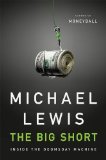
Critics' Opinion:
Readers' rating:
Published Mar 2010
288 pages
Genre: History, Current Affairs and Religion
Publication Information
A brilliant account - character-rich and darkly humorous - of how the U.S. economy was driven over the cliff.
Truth really is stranger than fiction. Who better than the author of the signature bestseller Liar's Poker to explain how the event we were told was impossible—the free fall of the American economy—finally occurred; how the things that we wanted, like ridiculously easy money and greatly expanded home ownership, were vehicles for that crash; and how shareholder demand for profit forced investment executives to eat the forbidden fruit of toxic derivatives.
Michael Lewis's splendid cast of characters includes villains, a few heroes, and a lot of people who look very, very foolish: high government officials, including the watchdogs; heads of major investment banks (some overlap here with previous category); perhaps even the face in your mirror. In this trenchant, raucous, irresistible narrative, Lewis writes of the goats and of the few who saw what the emperor was wearing, and gives them, most memorably, what they deserve. He proves yet again that he is the finest and funniest chronicler of our times. .
"Starred Review. Readers from generalists through specialists will find this fast-paced, engaging account both illuminating and disturbing. Highly recommended." - Library Journal
"His entertaining new book does not attempt a macro view of the financial crisis, but instead proposes to open a small window on the calamities by recounting the stories of some savvy renegades who cashed in on their conviction that the system was rotten … Mr. Lewis does a nimble job of using his subjects' stories to explicate the greed, idiocies and hypocrisies of a system notably lacking in grown-up supervision, a system filled with firms that "disdained the need for government regulation in good times" but 'insisted on being rescued by government in bad times.'" - The New York Times - Michiko Kakutani
"The Big Short manages to give us the truest picture yet of what went wrong on Wall Street—and why. At times, it reads like a morality play, at other times like a modern-day farce. But as with any good play, its value lies in the way it reveals character and motive and explores the cultural context in which the plot unfolds." - The Washington Post - Steven Pearlstein
This information about The Big Short was first featured
in "The BookBrowse Review" - BookBrowse's membership magazine, and in our weekly "Publishing This Week" newsletter. Publication information is for the USA, and (unless stated otherwise) represents the first print edition. The reviews are necessarily limited to those that were available to us ahead of publication. If you are the publisher or author and feel that they do not properly reflect the range of media opinion now available, send us a message with the mainstream reviews that you would like to see added.
Any "Author Information" displayed below reflects the author's biography at the time this particular book was published.
Michael Lewis was born October 15, 1960 in New Orleans, LA. He graduated from Princeton with a BA in Art History, and in 1985 received his master's degree from the London School of Economics. Salomon Brothers hired him as a bond salesman shortly after. He moved to New York for training and witnessed firsthand the cutthroat, scruple-free culture that was Wall Street in the 1980s. Several months later, armed only with what he'd learned in training, Lewis returned to London and spent the next three years dispensing investment advice to Salomon's well-heeled clientele. He earned hundreds of thousands of dollars and survived a 1987 hostile takeover attempt at the firm. Nonetheless, he grew disillusioned with his job and left Salomon to write an account of his experiences in the industry. ...





The House on Biscayne Bay
by Chanel Cleeton
As death stalks a gothic mansion in Miami, the lives of two women intertwine as the past and present collide.

The Flower Sisters
by Michelle Collins Anderson
From the new Fannie Flagg of the Ozarks, a richly-woven story of family, forgiveness, and reinvention.

The Funeral Cryer by Wenyan Lu
Debut novelist Wenyan Lu brings us this witty yet profound story about one woman's midlife reawakening in contemporary rural China.
Your guide toexceptional books
BookBrowse seeks out and recommends the best in contemporary fiction and nonfiction—books that not only engage and entertain but also deepen our understanding of ourselves and the world around us.